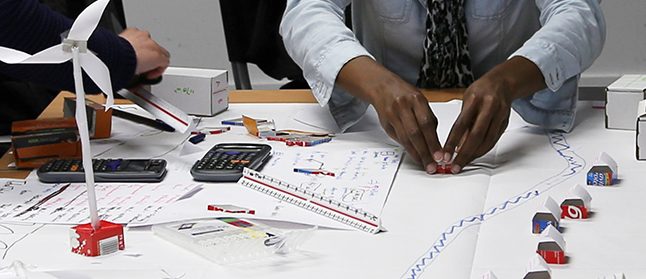
The world leading Centre for Doctoral Training in Sustainable Infrastructure for Cities (CDT-SIC) at the University of Southampton aims to produce the next generation of engineers and scientists with the interdisciplinary skills needed to develop global infrastructure that is essential for economic growth, security, societal wellbeing and environmental sustainability. The CDT-SIC is jointly funded by the Engineering and Physical Sciences Research Council (EPSRC), the University of Southampton, UKCRIC and industrial partners.
Sustainable Infrastructure for Cities challenges conventional thinking that has approached infrastructure as separates sectors and seeks to create interdependent research covering the infrastructure sectors of Water, Transport and Energy. In order to do this CDT-SIC adopts a cohort training approach to deliver talented engineers with the diverse skill-set required to meet present and future global infrastructure challenges. The skills we aim to develop comprise:
- Technical expertise relevant to specific infrastructure sectors;
- Wider technical understanding to enable integration and transformative thinking across the sectors;
- Ability to work at the interdisciplinary interface, with understanding of a range subject areas;
- Awareness of environmental context and ability to develop sustainable solutions that address the requirements of environmental legislation;
- Understanding of the societal perspectives and attitudes that frequently result in impediments to progress and sometimes complete impasse;
- Underpinning generic skills in mathematics, research, leadership and management, and multimedia communication with a variety of audiences ;
- International perspective, to be able to translate and adapt thinking from one set of societal or environmental conditions to others.
The CDT doctoral programme is four years in length, comprising of a three-year research degree with integrated professional and research skills training and development components to compliment and challenge the students pursuit of results during this research project with supervisors and industrial partners.

During the 4 year programme the students undertake their PhD research project co-created in conjunction with a team of supervising academics and industrial mentors. Industry partners will therefore have ample opportunity to work alongside students and academic staff throughout the life of the project. Where beneficial and appropriate a significant proportion of a student’s time may be spent in industry – for example, collecting data or working alongside experienced mentors.
Throughout the doctoral programme the students will undertake professional development through taught material and cutting-edge transferable and technical skills tailored to the requirements of each student’s research area, including a Group Project. Courses/modules during the first year are selected in consultation with SIC staff, supervisors and industry mentors to best support a student research, career development and personal goals.
The Sustainable Infrastructure for Cities Centre for Doctoral Training is seeking industrial sponsors to collaborate on four year PhD research projects in technologies and applications for Sustainable Infrastructure. Projects will receive additional funding from the Engineering and Physical Sciences Research Council (EPSRC) and sponsors may also be eligible for R and D tax credits.
This is an ideal opportunity for your company to be involved in creating and driving a research project tailored to your own company’s development needs, with access to world class research facilities and experts in Sustainable Infrastructure.

Why sponsor a Sustainable Infrastructure for Cities CDT student?
The Sustainable Infrastructure for Cities Doctoral Training Centre is seeking industrial sponsors to collaborate on four year PhD research projects in technologies and applications for Sustainable Infrastructure. Projects will receive additional funding from the Engineering and Physical Sciences Research Council (EPSRC) and sponsors may also be eligible for R and D tax credits.
This is an ideal opportunity for your company to be involved in creating and driving a research project tailored to your own company’s development needs, with access to world class research facilities and experts in Sustainable Infrastructure.

Why sponsor a CDT project
- It is a cost effective way for companies to get involved in relevant leading edge research which most companies would not have the funding, expertise or equipment to undertake alone.
- The research project is based on a proposal from the sponsoring company, so the research is of real technical and commercial significance to the sponsor.
- Our students are graduates who possess excellent academic track records and are highly committed to solving real world research problems, who are given excellent sustainable infrastructure training specific to the research they will be conducting in addition to wide ranging professional skills training – an excellent asset to the sponsor.
- Through the Centre your organisation will have access to world-leading expertise in sustainable infrastructure and start-of-the-art equipment, and will be part of an extended network of EPSRC sponsored Doctoral Training Centres in the UK.
- Research projects are developed between the sponsoring company and the supervisory team, ensuring real relevance of the work to the sponsor.
- The University of Southampton has invested £138m in the Boldrewood Innovation campus, which includes the National Infrastructure Laboratory.
What will it cost?
The standard industrial sponsor contribution for a four year studentship is £48,000 (£12,000 pa), with ESPRC contributing the equivalent of £68,000 (see below for more details). Sponsors may also be able to claim Research and Development tax credits.
Industrial Sponsor Contribution: £48,000 (£12,000 per annum):
- £12k for project experimental costs
- £10k for expenses relating to the studentship – eg conferences, travel, laptop, safety equipment etc
- £19k contributions to student stipend (yielding a stipend of £15k pa) and academic fees
- £7k contribution to administration costs of the Centre
* The standard sponsorship package assumes that project experimental costs will not exceed £12k; if this is not the case sponsors may need to provide additional funds /resources. Sponsors may also choose to top up the student stipend further to attract the most talented students.
EPSRC contribution – this is equivalent to £68k per studentship, comprising contributions to the student stipend and academic fee, RTSG and to general delivery costs.
Alternatively, sponsors may fully sponsor the project, or sponsor a current employee through the programme on a part time basis. Contact the Centre for advice about these options and the costs involved.
How are projects selected?
Potential sponsors are asked to download and submit an outline using the Proposal Form. The ISC and Academic Board will (after further consultation with you if necessary) evaluate the proposal.
What about IPR?
Every project is a close partnership between the sponsor and the University, and there will be some joint outputs and publications. We can negotiate IP arrangements, and will follow a reasonable approach to publication (i.e. sponsor prior approval, removal of sensitive information, timing of publication etc).
How are students recruited?
We advertise widely through the relevant channels, and sponsors are also encouraged to advertise the studentships. Candidates must have or expect to obtain a first or good 2:1 degree or strong Masters in a relevant subject. We manage the overall recruitment process.
Start dates
We accept applications from final year students, recent graduates and those already in employment. To maximise the number of strong applications our experience shows that many final year students start looking for research study / employment between September and January in their final year.
Indicative deadlines The ISC and Board reviews project proposals at regular intervals throughout the year, until the EPSRC co-funding is exhausted. We recommend that you contact the Centre as soon as possible if you are considering submitting a project proposal.
Further information
The starting point is the definition of a research project, and allocation of a suitable team of academics at Southampton. If you already have contacts at Southampton, you could get in touch with them to discuss possible projects to be funded via the Sustainable Infrastructure for Cities CDT route. If you haven’t got these contacts yet, please get in touch with one of the people listed below and we will assist in determining a suitable expert team to plan and deliver the desired project.
This page can only provide an overview of the CDT in Sustainable Infrastructure for Cities and it must be emphasised that each project is different and can, within limits, be tailored to the needs of the student and sponsor. For further information please visit our website at: http://cdt-sis.soton.ac.uk/ or to discuss a particular project please contact:
- Professor Paul Kemp (Sustainable Infrastructure for Cities CDT Director), P.Kemp@soton.ac.uk, Tel. 023 8059 5871
- Mrs Jennifer Knight (Sustainable Infrastructure for Cities CDT Manager), cdt-sis@soton.ac.uk
